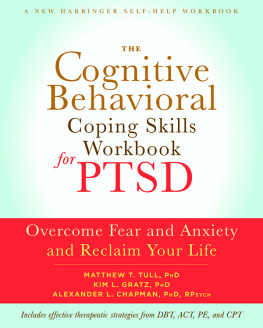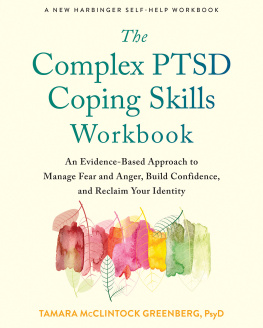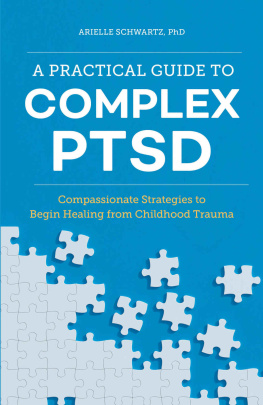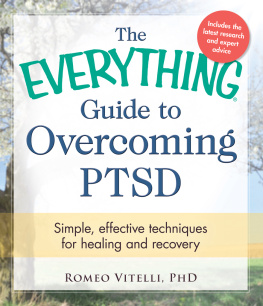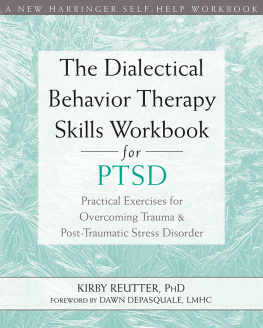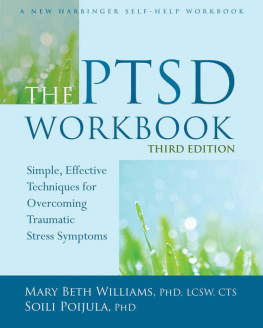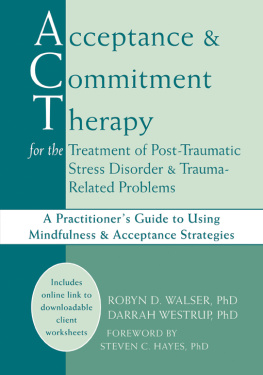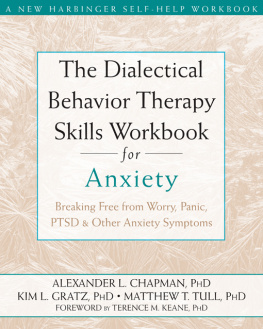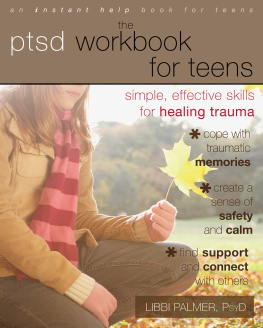
Struggling with post-traumatic stress disorder (PTSD) can take a considerable toll on ones quality of life. And finding ways to move forward can be challenging. Fortunately, TheCognitiveBehavioralCopingSkillsWorkbook for PTSD synthesizes an array of well-researched strategies, and offers readers a clear path toward expanding their coping repertoire and making meaningful life changes.
SusanM. Orsillo, PhD, professor of psychology at Suffolk University, and coauthor of WorryLess, Live More and Mindfulness- and Acceptance-Based Behavioral Therapies in Practice
For those struggling after a traumatic life experience, this book offers practical steps to identify symptoms of PTSD, along with cutting-edge cognitive behavioral strategies. Readers can then choose which symptoms are most bothersome, and systematically address each one. Importantly, the authors also include strategies that can help readers to increase positive emotions and well-being. This is a practical, reader-friendly book written by leaders in the field of trauma, emotion regulation, and management of impulsive, risky behavior. I highly recommend this book for those trying to manage their PTSD symptoms, as well as for clinicians who may be seeking a companion text in therapy.
Sandra B. Morissette, PhD, professor of clinical psychology at The University of Texas at San Antonio
In this outstanding manual, Tull, Gratz, and Chapmanleading experts in the field of emotion regulationapply their considerable knowledge and skills to helping people with PTSD. If you are struggling with the emotional aftermath of a traumatic experience, this manual will walk you through the steps of managing out-of-control emotions, facing fears, correcting distorted thinking patterns, and increasing positive feelings. I anticipate that this book will help a great many people, and will recommend it to my own patients.
David Tolin, PhD, author of FaceYourFears
TheCognitiveBehavioralCopingSkillsWorkbookforPTSD provides an extremely helpful, evidence-based, accessible guide to addressing the range of challenges that people with PTSD face. Tull, Gratz, and Chapman draw from their research knowledge and clinical expertise to provide a range of strategies that can help people recovering from trauma to engage more fully in their lives. By grouping strategies according to different clusters of symptoms, theyve created a book that can easily be used by people who are facing different challenges. The evidence-based strategies are helpful for those in great distress, as well as for those who are struggling less, but still want some help with lingering effects of trauma.
Lizabeth Roemer, PhD, professor of psychology at the University of Massachusetts Boston, and coauthor of WorryLess, Live More
This workbook represents a major step forward for improving the acquisition and retention of cognitive behavioral therapy (CBT) skills. The authors are in an exceptionally good position, as clinicians and researchers, to identify needed skills and focus upon them in the therapeutic context. This book is strongly recommended for clinicians and for the clinics in which they work. Its an important advance in the care of patients with trauma exposure and PTSD symptoms.
Terence M. Keane, PhD, associate chief of staff, research and development, VA Boston Healthcare System; director of the behavioral science division at the National Center for PTSD; and professor of psychiatry and psychology and assistant dean for research at Boston University School of Medicine
I have been waiting for this book (or one like it) for many years! There are lots of self-help books out there on overcoming trauma, but none is as firmly grounded in proven therapeutic strategies as this one. The book is easy to read, and filled with examples and exercises that bring the therapy to life. The experience, expertise, and compassion of the authors shine through. Everyone who struggles with post-traumatic stress should read this book, and so should their therapists!
Martin M. Antony, PhD, ABPP, professor of psychology at Ryerson University, Toronto, Canada, and coauthor of TheShynessandSocialAnxietyWorkbook and TheAnti-Anxiety Workbook
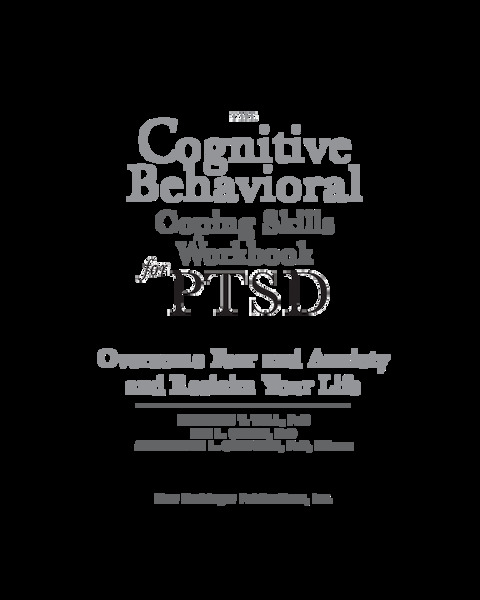
Publishers Note
This publication is designed to provide accurate and authoritative information in regard to the subject matter covered. It is sold with the understanding that the publisher is not engaged in rendering psychological, financial, legal, or other professional services. If expert assistance or counseling is needed, the services of a competent professional should be sought.
Distributed in Canada by Raincoast Books
Copyright 2016 by Matthew T. Tull, Kim L. Gratz, and Alexander L. Chapman
New Harbinger Publications, Inc.
5674 Shattuck Avenue
Oakland, CA 94609
www.newharbinger.com
Cover design by Amy Shoup
Acquired by Catharine Meyers
Edited by Jennifer Eastman
All Rights Reserved
Library of Congress Cataloging-in-Publication Data on file
To all of my clients with PTSDyour courage, strength, and perseverance are admirable and inspirational. Thank you for sharing your stories of recovery and resilience.
Matthew T. Tull
To all the trauma survivors I have had the honor of working with over the years. Your courage and strength are an inspiration.
Kim L. Gratz
To all of the clients I have worked with and learned so much from.
Alexander L. Chapman
Contents
Matthew T. Tull
Kim L. Gratz
Alexander L. Chapman
I am grateful to so many people who have mentored, supported, and inspired me on my journey through my life and career. First, I would like to acknowledge all of the clients whom I have worked with through the years. I am deeply touched by the fact that you have been willing to share your stories with me and provide me with the opportunity to bear witness to your courage, commitment, and perseverance as you work toward building the life you want to live. I consider it an honor to be a part of your recovery process, and through your resilience and strength, I have gained invaluable knowledge about the human condition and spirit. All of you are an inspiration to me.
I would also like to express my gratitude to all the mentors I have had through the years, especially Lizabeth Roemer, Sandra Morissette, and Carl Lejuez. You each have had a unique influence on my life and career, and I am grateful for all the time and energy you have devoted and continue to devote to my professional life. I would also like to thank all of my collaborators and colleagues that I am also fortunate to call friendsAlex Chapman, Zach Rosenthal, Andres Viana, Jon Elhai, Laura Dixon, Aaron Lee, Mike Anestis, Nicole Weiss, Katie Dixon-Gordon, and Mike McDermott. You make this work fun, and I am continuously inspired by your intellect, creativity, and passion for the work that you do.
I also consider it a privilege to be able to write this book with Alex Chapman and Kim Gratz. I would have never taken on such an endeavor without their support and contribution. I am always impressed by their commitment to disseminating their knowledge. In reading their work for this book, I have learned a great deal from them, and I am excited to share this knowledge with my clients and students.
Next page
